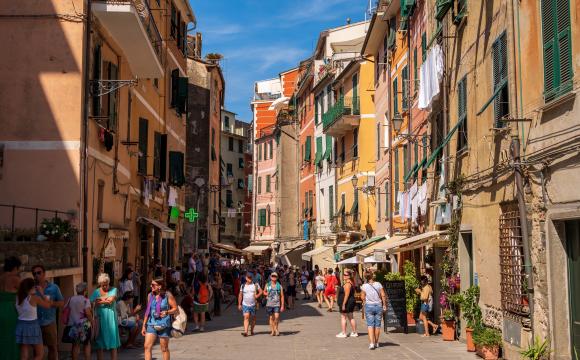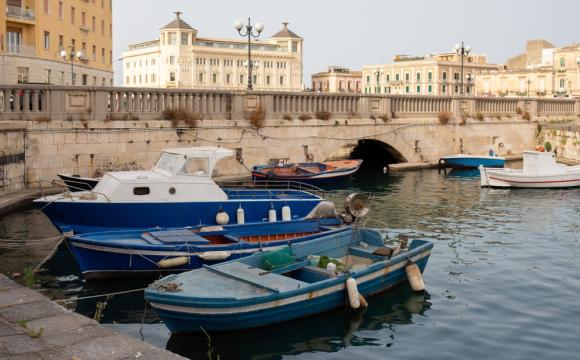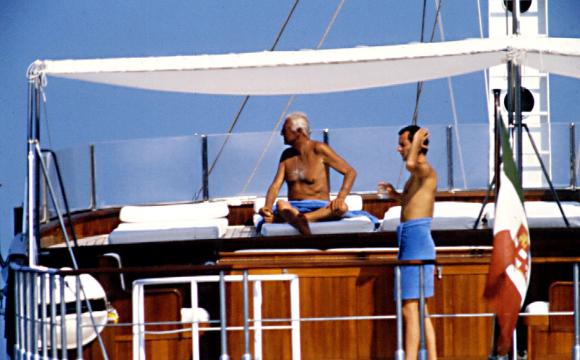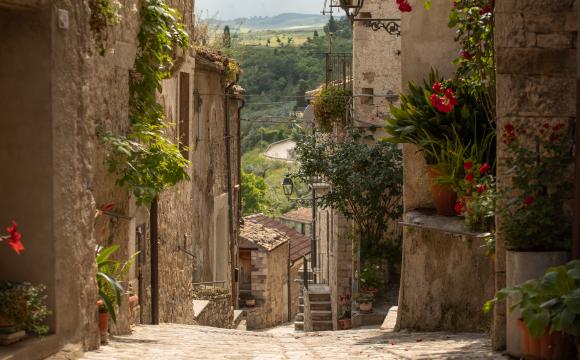 Supertenor Luciano Pavarotti, born in the northern Italian city of Modena in 1935, rose to become probably the world's most famous opera singer.
Supertenor Luciano Pavarotti, born in the northern Italian city of Modena in 1935, rose to become probably the world's most famous opera singer.
While his forerunners and contemporaries have mainly stuck to the opera world, Pavarotti also conquered the mainstream musical market, scaling pop and classical charts alike with ease.
Although he officially retired in 2004, he continued to perform occasionally until mid-2006, when he was diagnosed with cancer.
CAREER.
Pavarotti made his opera debut in Reggio Emilia in 1961, performing the part of Rodolfo in La Boheme. His first US performance took place in February 1965, and he performed at La Scala in Milan just two months later for the first time.
His first big international breakthrough came in 1972, when he received a record 17 curtain calls during a performance at New York's Metropolitan Opera.
He started appearing regularly on TV, winning a string of Grammy Awards and platinum and gold discs.
His next huge break came in 1990, when his rendition of "Nessun Dorma" from Giacomo Puccini's Turandot became the theme song of the 1990 FIFA World Cup in Italy. The aria achieved pop status and is his trademark song to this day.
On the eve of the World Cup final that year, he performed at the now legendary Three Tenors concert in Rome, with fellow tenors Placido Domingo and Jose Carreras. The recording of this event became the biggest selling classical record of all time.
Three Tenors concerts have since then been staged at soccer World Cups in Los Angeles in 1994, in Paris in 1998 and in the Japanese city Yokohama in 2002.
Pavarotti directed his first opera in December 2003, Giacomo Puccini's 'La Boheme'.
The novelty of his production was that he set it in the Paris of the 1950s, rather than at the end of the 19th century.
The opera was staged in August 2004 in Sicily's Valley of the Temples.
Pavarotti drew record crowds during a string of outdoor concerts in the 1990s, including venues such as London's Hyde Park, the Great Lawn of New York's Central Park and in front of the Eiffel Tower in Paris.
On February 10, 2006, Pavarotti sang his trademark "Nessun Dorma" aria at the 2006 Winter Olympics Opening Ceremony in Turin, Italy.
The final act of the opening ceremony, his performance received the longest and loudest ovation of the night from the international crowd.
'Big Luciano' organized and appeared in ten Pavarotti & Friends charity concerts in his hometown of Modena. These saw him sing with other top names from across the music industry, such as U2 frontman Bono, Queen, Andrea Bocelli, Sting, Liza Minelli and many others, raising millions for UN causes in the process.
In 2001, the tenor received a medal from the UN High Commission for Refugees for his fund-raising efforts. Through benefit concerts and volunteer work, he has raised more than 10.5 million US dollars, more than any other single individual.
PERSONAL LIFE.
Pavarotti was born in Modena on October 12 1935. His father was a baker and his mother worked in a cigar factory.
He loved to sing from an early age and started training seriously when he was 20, although he first earned his living as an elementary school teacher and later an insurance salesman.
After an eight-year engagement, he married Adua Veroni in 1961. Within six years, they had three daughters: Lorenza (44), Cristina (42) and Giuliana (39). They also have a grandchild.
He separated from his wife in 1996, after a popular gossip magazine leaked the news that he was having an affair with his then 26-year old secretary, Nicoletta Mantovani.
Mantovani gave birth to twins in January 2003, although only one survived, a girl named Alice. At the end of the year, the couple wed.
Pavarotti was diagnosed with pancreatic cancer in July 2006 and underwent emergency surgery. His remaining appearances for the year were cancelled, as he continued treatment.
The pancreas operation interrupted Pavarotti's two-year worldwide farewell tour. The tenor gave his last performance in an opera at the New York Metropolitan Opera on March 13, 2004.
He received a 12-minute standing ovation for his role as the painter Mario Cavaradossi in Giacomo Puccini's Tosca.
In retirement he had intended to dedicate his time to teaching and opera direction, as well as do occasional 'Three Tenors' concerts.












